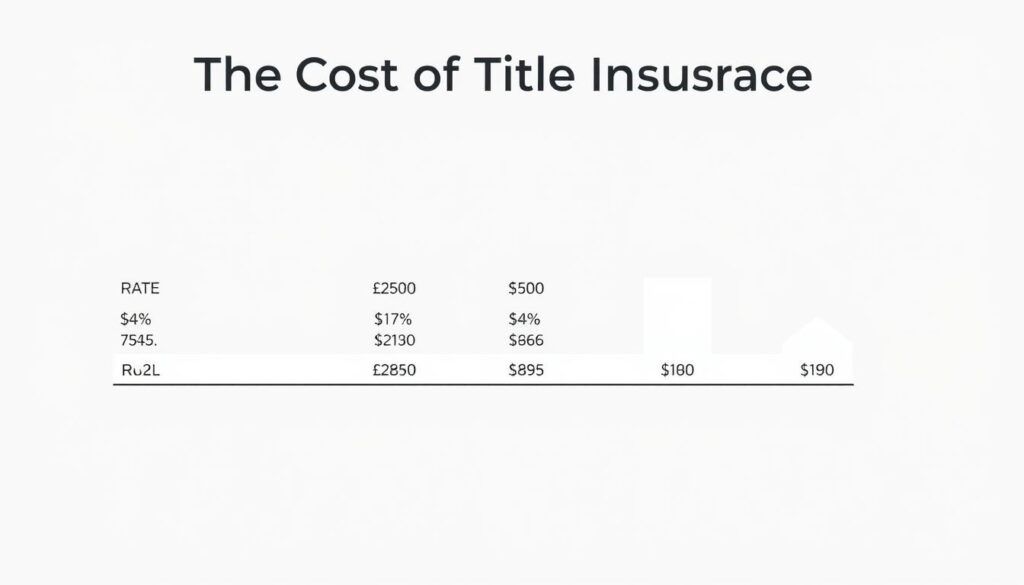When we buy a property, we might think title insurance is only for those with a mortgage. But, this is not always true. Title insurance is key in protecting our investment, no matter how we pay.
Even as cash buyers, we’re not safe from title problems. Issues like hidden liens or mistakes in public records can happen. Getting title insurance can help protect our property rights.
It’s important to know why title insurance matters in a cash sale. It’s not just a precaution. It’s a must to keep our investment safe.
Key Takeaways
- Title insurance is crucial for protecting property investments.
- Cash buyers are not exempt from potential title issues.
- Title defects can arise from unforeseen liens or public record errors.
- Title insurance provides a safeguard against these risks.
- Securing title insurance is a necessary step in a cash sale.
Understanding Title Insurance and Its Importance
Title insurance is key to protecting your property rights. It’s important to understand why it matters. Let’s dive into what title insurance is and why it’s crucial in real estate.
What is Title Insurance?
Title insurance guards against risks like hidden liens or errors in records. It ensures property owners can enjoy their property without worries. This insurance is vital for both property owners and lenders.

How Does Title Insurance Work?
Getting title insurance starts with a title search. This search checks public records for any issues. It confirms the seller’s right to sell and checks for hidden liens.
After the search, a title insurance policy is issued. This policy protects against future claims. Title insurance is unique because it covers past events, not just future risks.
Different Types of Title Insurance Policies
There are two main types: lender’s title insurance and owner’s title insurance. Lender’s insurance protects the lender, while owner’s insurance protects the buyer. Cash buyers should get owner’s title insurance to protect their investment.
Knowing about these policies helps cash buyers make smart choices. The right policy ensures their property rights are safe and they avoid risks.
The Role of Title Insurance for Cash Buyers
Even if you pay cash, you still face risks. Title insurance can help with these risks. Many think cash buyers don’t need it, but this can be very costly.

Why Cash Buyers Still Need Title Insurance
Title insurance isn’t just for those with mortgages. It’s for anyone wanting to protect their investment. Cash buyers can still face title defects, like hidden liens or errors in records. These can lead to expensive legal fights and even losing the property.
Here are some reasons cash buyers need title insurance:
- Protection against title defects and liens
- Ensuring clear ownership of the property
- Coverage for legal costs in case of title disputes
Protecting Against Title Defects
Title defects can come from many places, like forged documents or undisclosed heirs. Title insurance helps by checking public records and making sure the title is clear.
The benefits of title insurance for cash buyers are:
- Financial protection against potential title issues
- Peace of mind knowing their investment is secure
- Help with solving title problems that might come up
Ensuring Clear Ownership
Having clear ownership is key when buying a property. Title insurance makes sure the buyer owns the property without surprises. This is especially important for cash buyers, who invest a lot without a mortgage.
Understanding title insurance helps cash buyers make smart choices. It protects their investment.
The Benefits of Title Insurance
Title insurance offers more than just financial protection. It gives homeowners peace of mind. Cash buyers can see the value it adds to their real estate deals.
Peace of Mind for Homeowners
One big plus of title insurance is the peace of mind it brings. It ensures your ownership is safe. This lets you enjoy your home without worrying about title problems.

Financial Protection from Claims
Title insurance gives financial protection from claims on your property. If someone disputes your ownership, it can help pay for solving the issue. This protects your investment.
Some key financial protections include:
- Coverage for losses due to title defects
- Protection against unforeseen liens and encumbrances
- Financial assistance in resolving ownership disputes
Coverage for Legal Costs
Also, title insurance covers legal costs for defending your title. Legal fights can be expensive and take a lot of time. But with title insurance, you don’t have to worry about these costs.
The legal costs it covers are:
- Attorney fees for defending your title
- Court costs for solving title disputes
- Other expenses for clearing title issues
Potential Risks of Forgoing Title Insurance
Not getting title insurance can be a big mistake for cash buyers. It leaves them open to unexpected title problems. Even though it might seem like extra money, title insurance is key to protecting property owners from risks.
Hidden Liens and Judgments
One big risk without title insurance is hidden liens and judgments. These are legal claims against the property that buyers don’t find out about until later. For example, a contractor might have a lien for unpaid work, or there could be an old judgment that affects the title.
These hidden liens can cause expensive legal fights and might even lead to losing the property. Title insurance helps by making sure the title is clear and protects against such claims.
Ownership Disputes
Another risk without title insurance is ownership disputes. These can happen for many reasons, like forged signatures or unknown heirs. Fixing these disputes can take a lot of time and money.
Title insurance acts as a shield against these disputes. It checks if the seller can sell the property and makes sure the buyer’s ownership is recognized.
Future Liability Issues
Cash buyers without title insurance might also face future liability issues. For instance, if a title problem is found after buying, the buyer might have to fix it, even if it was there before they owned it. This could mean paying for title fixes or compensating others with claims.

Knowing these risks helps cash buyers decide if they should get title insurance. It might seem like extra money upfront, but it can save a lot of financial and legal trouble later on.
The Cost of Title Insurance
Title insurance costs can vary a lot. It’s key for cash buyers to know why. The price changes based on the property’s location and value.
Factors Affecting Title Insurance Costs
Several things affect title insurance costs. Property location is a big one. Different states have different rules and fees for title insurance. The property value also matters, as more expensive properties cost more to insure.
The cost of title insurance varies across the US. It depends on local laws, the type of property, and the insurance company.
Average Pricing for Title Insurance in the US
On average, title insurance costs 0.5% to 1% of the property’s price. For a $500,000 property, that’s $2,500 to $5,000.
Comparing Costs Across Different States
Different states have different title insurance costs. For example, Texas and Florida have higher costs than other states.
| State | Average Title Insurance Cost | Cost as a Percentage of Property Value |
|---|---|---|
| Texas | $4,000 – $6,000 | 0.8% – 1.2% |
| Florida | $3,500 – $5,500 | 0.7% – 1.1% |
| California | $2,000 – $4,000 | 0.4% – 0.8% |

The table shows big differences in title insurance costs across states. Cash buyers should look up the costs for their state and area.
Choosing the Right Title Insurance Company
Choosing the right title insurance company is key to protecting our investment. With the many benefits of title insurance for cash buyers, picking the right provider is essential.
Researching Title Insurance Providers
Start by researching the reputation and experience of title insurance providers. A company with a good track record offers reliable services. Ask real estate professionals or friends for recommendations.
Online reviews and ratings can also help. Look for providers that are members of professional associations, like the American Land Title Association (ALTA). This shows they follow industry standards.
What to Look for in Title Insurance Companies
When evaluating title insurance companies, consider several factors. Reliability, customer service, and coverage options are important. Choose a company known for handling claims well and offering comprehensive coverage.
| Feature | Importance | What to Look For |
|---|---|---|
| Reliability | High | Strong industry reputation, low complaint ratio |
| Customer Service | High | Responsive, helpful customer support |
| Coverage Options | High | Comprehensive coverage, flexible policy options |
A real estate expert says, “The right title insurance company can make a big difference. It gives peace of mind and financial protection.”
“Title insurance is not just about protecting against title defects; it’s about ensuring a smooth transaction and future security for homeowners.”
Reading Reviews and Testimonials
Reading reviews and testimonials from previous clients is helpful. Look for feedback on multiple platforms. Positive comments about customer service and claims handling are reassuring.
By researching and evaluating title insurance providers, we can make a smart choice. This choice aligns with our needs and enhances the benefits of title insurance for cash buyers. Understanding why cash buyers might consider title insurance is key to appreciating the value of the right provider.
The Closing Process and Title Insurance
Understanding title insurance is key in real estate. The closing process is the last step in buying a home. It’s when the property’s ownership moves from the seller to the buyer.
Title insurance is vital here. It makes sure the buyer gets a clear title. This means the title insurance company checks if the seller can sell the property. They also look for any hidden liens or problems with the title.
How Title Insurance Fits into Closing
In the closing process, title insurance companies work with everyone involved. They help make sure the transaction goes smoothly. Here’s how title insurance helps:
- They check if the seller can sell the property.
- They find and fix any title problems.
- They give a title insurance policy to protect the buyer and lender.
Timing of Title Insurance Purchase
When to buy title insurance is very important. Buyers usually get it right before the deal is done. This way, they’re safe from any title problems that might come up later.
Even cash buyers need title insurance. It protects against title issues, even when paying cash.
Required Documentation
To get title insurance, you need some documents. These include:
- A copy of the sale deed or purchase agreement.
- Proof of who you are and who owns the property.
- Any other important documents about the property.
Knowing how title insurance works in the closing process helps. It makes buying a home smoother and safer.
Common Misconceptions about Title Insurance
Many myths surround title insurance, especially for cash buyers. People often misunderstand what it covers and who needs it. By clearing up these myths, we can see why title insurance is key in real estate.
Myth: Title Insurance is Only for Mortgaged Properties
One big myth is that title insurance is only for mortgaged properties. But, title insurance for cash buyers is just as important. Cash buyers can still face title problems, like unknown liens or boundary disputes.
For example, a cash buyer might buy a property with an outstanding lien. Without title insurance, they could lose a lot of money and face legal battles.
Myth: Title Insurance is Optional
Some think title insurance is optional. But, it’s not optional if you want to protect your investment. Cash sale title insurance is vital for avoiding title problems after buying.
“Title insurance is not just for mortgaged properties; it’s a critical component of any real estate transaction, providing peace of mind and financial protection against unforeseen title defects.”
Myth: Title Insurance is a One-Time Cost
Some believe title insurance covers you forever after paying once. While the premium is paid once, the coverage lasts as long as you own the property. This means the protection is long-term, even though the cost is one-time.
| Myth | Reality |
|---|---|
| Title insurance is only for mortgaged properties. | It’s essential for all property buyers, including cash buyers, to protect against title defects. |
| Title insurance is optional. | While not legally required, it’s highly recommended to protect your investment. |
| Title insurance is a one-time cost with limited coverage. | The one-time premium provides long-term coverage for as long as you own the property. |
By understanding these myths, we see why title insurance is valuable, even for cash transactions. It’s a smart move to protect your property rights and avoid financial risks.
Frequently Asked Questions on Title Insurance
Exploring title insurance can raise many questions, especially for cash buyers. We’ll tackle some common questions to understand its role and importance in real estate.
Do I need title insurance for a cash purchase?
Many cash buyers wonder if they need title insurance. But, title insurance is not just for mortgaged properties. It protects against title defects, liens, and other issues that could arise after the purchase.
Even without a mortgage, a cash buyer can face significant financial loss if a title issue emerges. For example, a previously undisclosed heir might claim ownership, or there could be an error in the public records that affects your title. Title insurance provides a safeguard against such risks.
How long does title insurance last?
Typically, a title insurance policy remains in effect as long as you or your heirs have an interest in the property. This means that once you purchase title insurance, you’re protected for as long as you own the property, and even beyond, for your heirs.
Unlike other types of insurance that require annual premiums, a one-time payment for title insurance can provide long-term protection. This aspect makes it a valuable investment for homeowners.
What happens if a title issue arises after closing?
If a title issue emerges after you’ve closed on your property, your title insurance policy will typically cover the costs associated with resolving the issue. This can include legal fees, court costs, and any potential loss in property value.
For example, if someone challenges your ownership, your title insurance company will work to defend your title. If the challenge is successful and you suffer a financial loss, the insurance company will compensate you according to your policy’s terms.
| Question | Answer |
|---|---|
| Do cash buyers need title insurance? | Yes, to protect against title defects and liens. |
| How long does title insurance last? | As long as you or your heirs have an interest in the property. |
| What happens if a title issue arises? | The title insurance company covers legal fees and potential losses. |
Final Thoughts on Title Insurance for Cash Buyers
As we wrap up our look at title insurance for cash buyers, some key points stand out. Buying title insurance is a big decision. It needs careful thought about different factors.
Weighing the Risks and Benefits
It’s important to balance the risks against the benefits when thinking about title insurance. For cash buyers, it guards against title problems. It makes sure ownership is clear and gives peace of mind. Even though it costs extra, the protection it offers is worth it.
Title insurance can shield against hidden liens, ownership disputes, and future legal issues. Knowing these risks helps cash buyers decide if they need title insurance.
| Risks | Benefits |
|---|---|
| Hidden Liens and Judgments | Protection against title defects |
| Ownership Disputes | Ensures clear ownership |
| Future Liability Issues | Peace of mind for homeowners |
Making an Informed Decision
To decide wisely on title insurance, cash buyers should think about their own situation. The property’s past, local laws, and the seller’s situation matter a lot.
By looking at these factors and knowing the cash buyer title insurance requirements, buyers can figure out if they need it.
Consulting with Real Estate Professionals
Talking to real estate pros is a smart move. Agents, lawyers, and title experts offer advice that fits your needs.
Getting advice from experts helps buyers understand title insurance’s good and bad sides. This way, they can make a better choice.
Resources for Further Information
If you want to learn more about title insurance, especially for cash buyers, we’ve got you covered. Figuring out if you need title insurance for a cash purchase can be tricky. These resources aim to clear up any confusion.
Reliable Online Resources
Many online platforms have detailed info on title insurance. The American Land Title Association (ALTA) is a top source. It explains why and how title insurance works for cash buyers. Websites like Zillow and Redfin also have articles on this topic.
Publications on Title Insurance
If you like reading in-depth, there are books and publications for you. “Title Insurance: A Comprehensive Overview” is a great read. It dives into the details of title insurance. These resources can help cash buyers make smart choices.
Local Real Estate Events
Going to local real estate seminars and workshops is also a good idea. These events have experts talking about title insurance and real estate law. You can ask questions and learn from those who deal with title insurance for cash buyers.
